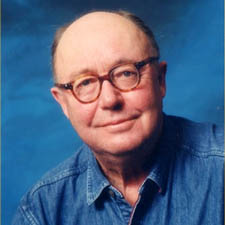Related Research Articles

Robert Endre Tarjan is an American computer scientist and mathematician. He is the discoverer of several graph algorithms, including Tarjan's off-line lowest common ancestors algorithm, and co-inventor of both splay trees and Fibonacci heaps. Tarjan is currently the James S. McDonnell Distinguished University Professor of Computer Science at Princeton University, and the Chief Scientist at Intertrust Technologies Corporation.

Ross John Anderson, FRS, FREng is a researcher, author, and industry consultant in security engineering. He is Professor of Security Engineering at the Department of Computer Science and Technology, University of Cambridge where he is part of the University's security group.

Ronald Linn Rivest is a cryptographer and an Institute Professor at MIT. He is a member of MIT's Department of Electrical Engineering and Computer Science (EECS) and a member of MIT's Computer Science and Artificial Intelligence Laboratory (CSAIL). His work has spanned the fields of algorithms and combinatorics, cryptography, machine learning, and election integrity.

The University of New South Wales is an Australian public research university located in the Sydney suburb of Kensington. In 2012, UNSW recorded the highest median ATAR of any university in NSW and attracted the highest number of top 500 students from the state. Established in 1949, it is ranked 4th in Australia, 43rd in the world according to the 2020 QS World University Rankings.

Andrei Alexandrescu is a Romanian-American C++ and D language programmer and author. He is particularly known for his pioneering work on policy-based design implemented via template metaprogramming. These ideas are articulated in his book Modern C++ Design and were first implemented in his programming library, Loki. He also implemented the "move constructors" concept in his MOJO library. He contributed to the C/C++ Users Journal under the byline "Generic<Programming>". Alexandrescu worked as a research scientist at Facebook, before departing the company in August 2015 in order to focus on developing the D programming language.

In cryptography, LOKI97 is a block cipher which was a candidate in the Advanced Encryption Standard competition. It is a member of the LOKI family of ciphers, with earlier instances being LOKI89 and LOKI91. LOKI97 was designed by Lawrie Brown, assisted by Jennifer Seberry and Josef Pieprzyk.

Lars Ramkilde Knudsen is a Danish researcher in cryptography, particularly interested in the design and analysis of block ciphers, hash functions and message authentication codes (MACs).

Eugene Howard Spafford, nicknamed Spaf, is an American professor of computer science at Purdue University and a leading computer security expert.

Andries "Andy" van Dam is a Dutch-American professor of computer science and former vice-president for research at Brown University in Providence, Rhode Island. Together with Ted Nelson he contributed to the first hypertext system, Hypertext Editing System (HES) in the late 1960s. He co-authored Computer Graphics: Principles and Practice along with J.D. Foley, S.K. Feiner, and John Hughes. He also co-founded the precursor of today's ACM SIGGRAPH conference.
Harlan D. Mills was Professor of Computer Science at the Florida Institute of Technology and founder of Software Engineering Technology, Inc. of Vero Beach, Florida. Mills' contributions to software engineering have had a profound and enduring effect on education and industrial practice. Since earning his Ph.D. in Mathematics at Iowa State University in 1952, Mills led a distinguished career.
Chennai Mathematical Institute (CMI) is a premier research and education institute in Chennai, India. It was founded by the SPIC Science Foundation in 1989, and offers undergraduate as well as postgraduate programmes in physics, mathematics and computer science, besides its key strength in the form of high-end research in Mathematics. CMI is noted for its research in the field of algebraic geometry, in particular in the area of moduli of bundles.
Jennifer Roma Seberry is an Australian cryptographer, mathematician, and computer scientist, currently a professor at the University of Wollongong, Australia. She was formerly the head of the Department of Computer Science and director of the Centre for Computer Security Research at the university.
Kaisa Nyberg is a Finnish cryptographer and computer security researcher.

Mark Diesendorf is an Australian academic and environmentalist, known for his work in sustainable development and renewable energy. He currently teaches environmental studies at the University of New South Wales, Australia. He was formerly professor of environmental science and founding director of the Institute for Sustainable Futures at the University of Technology, Sydney and before that a principal research scientist with CSIRO, where he was involved in early research on integrating wind power into electricity grids. His most recent book is Sustainable Energy Solutions for Climate Change.

Gernot Heiser is a Scientia Professor and the John Lions Chair for operating systems at the University of New South Wales (UNSW). He is also leader of the Software Systems Research Group (SSRG) at NICTA. In 2006 he co-founded Open Kernel Labs to commercialise his L4 microkernel technology.

Roger Michael Needham, CBE, FRS, FREng was a British computer scientist.
David Brumley is a Professor at Carnegie Mellon University. He is a well-known researcher in software security, network security, and applied cryptography. Prof. Brumley also worked for 5 years as a Computer Security Officer for Stanford University.
David Worrall is an Australian composer and sound artist working a range of genres, including data sonification, sound sculpture and immersive polymedia as well as traditional instrumental music composition.
Ping Koy Lam is an Australian scientist and Professor of Physics at the Australian National University in Canberra. He is currently an Australian Research Council Australian Laureate Fellow and a work package director and program manager in the ARC Centre for Quantum Computer and Communication Technology. For his PhD thesis in 1999 he was awarded the Australian Institute of Physics Bragg Medal. He was awarded the 2003 British Council Eureka Prize for inspiring science and the 2006 UNSW Eureka Prize for innovative research.
Stephen Thomas Kent is an American computer scientist, noted for his contributions to network security.